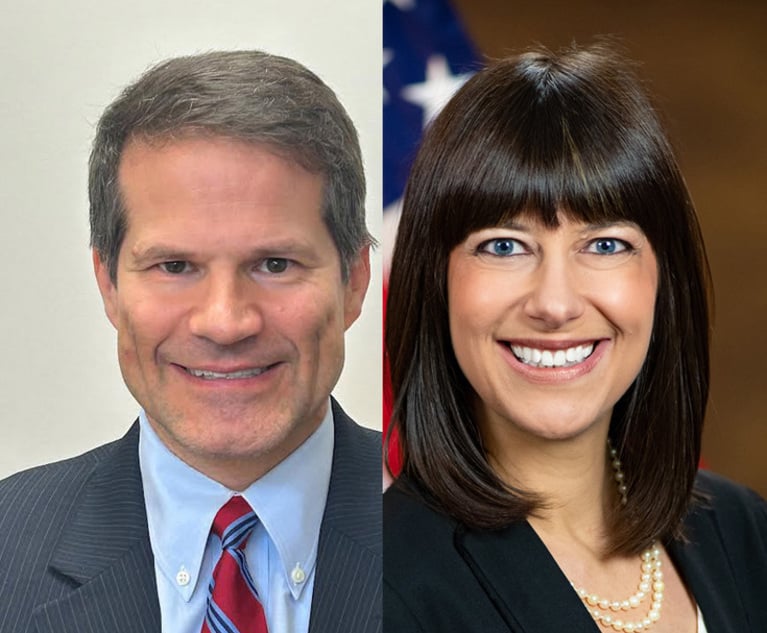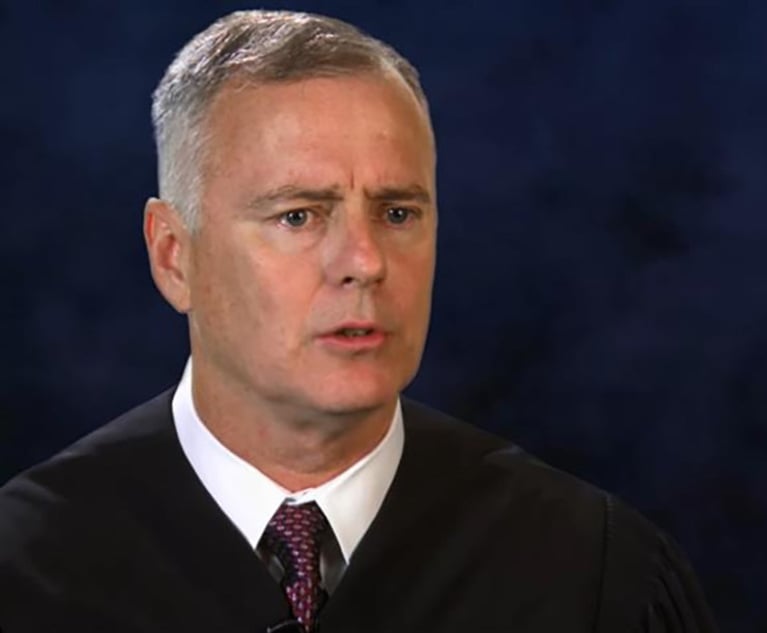'American Patriot': Justices Reflect on George H.W. Bush's Legacy
"Both he and Mrs. Bush were the essence of decency and kindness then and throughout the years," Justice Clarence Thomas said in a statement Saturday. Chief Justice John Roberts Jr. called George H.W. Bush an "American patriot and fundamentally decent man."
December 01, 2018 at 01:03 PM
4 minute read
When John Roberts Jr. was 37, serving as a top lawyer in the U.S. Justice Department's solicitor general's office in 1992, then-President George H.W. Bush nominated him to the U.S. Court of Appeals for the D.C. Circuit.
Roberts just a few years earlier had made his first argument in the U.S. Supreme Court, in the case United States v. Halper. He won that case, but he would not win confirmation to the appeals court. Roberts would have been among the youngest circuit nominees in history.
Roberts would have to wait more than a decade later for another D.C. Circuit appointment, which came in 2003 by George W. Bush, the son of the former president. Roberts was, of course, confirmed—and soon elevated to the U.S. Supreme Court.
On Saturday, Roberts issued a statement paying tribute to Bush: “I am saddened to learn of the passing of President George H. W. Bush. He was an extraordinary American patriot and fundamentally decent man. I extend my heartfelt condolences to the Bush family.”
George H.W. Bush's judicial legacy at the Supreme Court—back in focus now, on the former president's death Friday at age 94—rests in the service of Justice Clarence Thomas and the retired Justice David Souter. The two, of course, are markedly different, and only one is still serving.
Souter, nominated in 1990 to replace William Brennan Jr., is approaching nearly 10 years off the high court bench, but he still hears cases in the U.S. Court of Appeals for the First Circuit. Conservatives often lament the fact Souter, confirmed 90 to 9 in the Senate, turned out to be more liberal than desired. The mantra “No More Souters” is still heard in conservative circles.
Souter said in a statement Saturday: “The president was a gentleman who showed me great kindness, and for as long as memory serves I'll think back on him kindly and gratefully in return.”
Bush came under criticism when he described Thomas as “the most qualified” candidate for the Supreme Court when he nominated him to succeed Thurgood Marshall in 1991. But Thomas, confirmed by a narrow margin amid claims of sexual harassment—which he denied—has been a steadfast and popular conservative during his entire tenure on the high court.
“It is with deep and profound sadness that Virginia and I learned of the passing of President Bush,” Thomas said in a statement Saturday. “I was honored to be nominated by him to the United States Court of Appeals for the District of Columbia Circuit and the Supreme Court of the United States. Both he and Mrs. Bush were the essence of decency and kindness then and throughout the years. Virginia and I extend our thoughts and prayers to the entire Bush family.”
The senior Bush appointed Samuel Alito Jr. to the Third Circuit in 1990, and he would be elevated to the Supreme Court in 2006 by George W. Bush.
Many George H.W. Bush appointees still serve either actively or through senior status across the judiciary.
Among them: judges Karen LeCraft Henderson and A. Raymond Randolph serve on the D.C. Circuit; judges Ed Carnes, Susan Black and Joel Dubina on the Eleventh Circuit; Judge Ilana Rovner on the Seventh Circuit; judges Ferdinand Fernandez and Andrew Kleinfeld on the Ninth Circuit; Jane Roth on the Third Circuit; judges John Walker Jr. and Dennis Jacobs on the Second Circuit; Judge Paul Niemeyer on the Fourth Circuit; and judges Jacques Wiener Jr. and Rhesa Barksdale on the Fifth Circuit.
The Supreme Court said Sunday it will close Wednesday in honor of the national day of mourning for George H.W. Bush. The court has rescheduled Wednesday's argument—Gamble v. United States—to Thursday.
|Read more:
This content has been archived. It is available through our partners, LexisNexis® and Bloomberg Law.
To view this content, please continue to their sites.
Not a Lexis Subscriber?
Subscribe Now
Not a Bloomberg Law Subscriber?
Subscribe Now
NOT FOR REPRINT
© 2024 ALM Global, LLC, All Rights Reserved. Request academic re-use from www.copyright.com. All other uses, submit a request to [email protected]. For more information visit Asset & Logo Licensing.
You Might Like
View All

Trump's Solicitor General Expected to 'Flip' Prelogar's Positions at Supreme Court

Auditor Finds 'Significant Deficiency' in FTC Accounting to Tune of $7M
4 minute read
Texas Court Invalidates SEC’s Dealer Rule, Siding with Crypto Advocates
3 minute readTrending Stories
Who Got The Work
Michael G. Bongiorno, Andrew Scott Dulberg and Elizabeth E. Driscoll from Wilmer Cutler Pickering Hale and Dorr have stepped in to represent Symbotic Inc., an A.I.-enabled technology platform that focuses on increasing supply chain efficiency, and other defendants in a pending shareholder derivative lawsuit. The case, filed Oct. 2 in Massachusetts District Court by the Brown Law Firm on behalf of Stephen Austen, accuses certain officers and directors of misleading investors in regard to Symbotic's potential for margin growth by failing to disclose that the company was not equipped to timely deploy its systems or manage expenses through project delays. The case, assigned to U.S. District Judge Nathaniel M. Gorton, is 1:24-cv-12522, Austen v. Cohen et al.
Who Got The Work
Edmund Polubinski and Marie Killmond of Davis Polk & Wardwell have entered appearances for data platform software development company MongoDB and other defendants in a pending shareholder derivative lawsuit. The action, filed Oct. 7 in New York Southern District Court by the Brown Law Firm, accuses the company's directors and/or officers of falsely expressing confidence in the company’s restructuring of its sales incentive plan and downplaying the severity of decreases in its upfront commitments. The case is 1:24-cv-07594, Roy v. Ittycheria et al.
Who Got The Work
Amy O. Bruchs and Kurt F. Ellison of Michael Best & Friedrich have entered appearances for Epic Systems Corp. in a pending employment discrimination lawsuit. The suit was filed Sept. 7 in Wisconsin Western District Court by Levine Eisberner LLC and Siri & Glimstad on behalf of a project manager who claims that he was wrongfully terminated after applying for a religious exemption to the defendant's COVID-19 vaccine mandate. The case, assigned to U.S. Magistrate Judge Anita Marie Boor, is 3:24-cv-00630, Secker, Nathan v. Epic Systems Corporation.
Who Got The Work
David X. Sullivan, Thomas J. Finn and Gregory A. Hall from McCarter & English have entered appearances for Sunrun Installation Services in a pending civil rights lawsuit. The complaint was filed Sept. 4 in Connecticut District Court by attorney Robert M. Berke on behalf of former employee George Edward Steins, who was arrested and charged with employing an unregistered home improvement salesperson. The complaint alleges that had Sunrun informed the Connecticut Department of Consumer Protection that the plaintiff's employment had ended in 2017 and that he no longer held Sunrun's home improvement contractor license, he would not have been hit with charges, which were dismissed in May 2024. The case, assigned to U.S. District Judge Jeffrey A. Meyer, is 3:24-cv-01423, Steins v. Sunrun, Inc. et al.
Who Got The Work
Greenberg Traurig shareholder Joshua L. Raskin has entered an appearance for boohoo.com UK Ltd. in a pending patent infringement lawsuit. The suit, filed Sept. 3 in Texas Eastern District Court by Rozier Hardt McDonough on behalf of Alto Dynamics, asserts five patents related to an online shopping platform. The case, assigned to U.S. District Judge Rodney Gilstrap, is 2:24-cv-00719, Alto Dynamics, LLC v. boohoo.com UK Limited.
Featured Firms
Law Offices of Gary Martin Hays & Associates, P.C.
(470) 294-1674
Law Offices of Mark E. Salomone
(857) 444-6468
Smith & Hassler
(713) 739-1250








